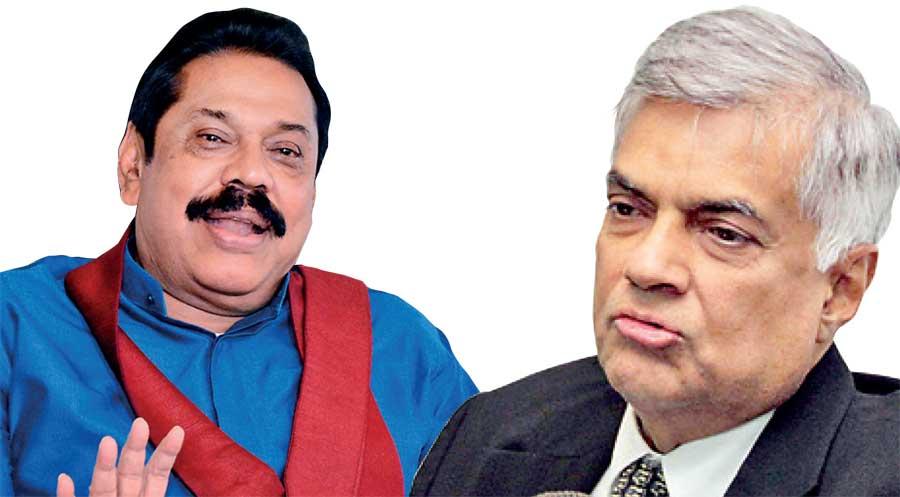Reply To:
Name - Reply Comment

I had an interesting conversation with a student recently. He had encouraged his parents to vote for the present regime, not because of Maithripala Sirisena, but because of the man he felt sure would be elected as Prime Minister. Ranil Wickremesinghe, he told me, was the only (great) hope for the young, because he could deliver. Why could he deliver? Because of his vision. Why had people rejected that vision at close to 30 elections? Because the people were dumb, and also predominantly old. But shouldn’t a politician articulate policies which fit in with the needs of the country? Yes, but sometimes we need to go beyond rhetoric. 
It was not Ranil Wickremesinghe who won the 2015 election, but it was Wickremesinghe who made Sirisena’s victory possible, at least in part. Therefore, the claim that the election was as much Sirisena’s as it was Wickremesinghe’s is correct, if only half-correct; in any case, what propelled him to power (power, mind you, which he finally regained after more than two decades of consistently losing) more than anything else was the belief, ingrained so much in the minds of those who support him that you can’t erase it away, that the people are so dumb they cannot appreciate him. If politics is the art of the possible, Ranil has played that game well; the student, who now regrets having supported Maithripala wants to see the UNP back and Wickremesinghe riding the horse (or the elephant), armed with a whip (or a goad). Whip or goad, the analogy isn’t crude or uncalled for; according to Qadri Ismail, in the 1980s the man had once called for the horsewhipping of striking undergraduates.
"Last king or last liberal, such honorifics reveal how we remain a nation of look-uppers, even those among us who reject the practice of conferring honorifics on politicians"
In Sri Lanka, as in South Asia, the cult of the personality endures. The UNP need not point at Gotabaya Rajapaksa or Mahinda Rajapaksa for evidence of this, when that ritualistic, school-boyish culture that gave rise to him has its roots closer to home. The deification of political leaders goes back to the colonial era, if not before, when patronage was extended to headmen and adigars in the form of land grants and titles; consider that the British, who made use of pre-colonial practices for their ends, resorted to these grants and titles to reward local proxies. The bourgeoisie which emerged from this intricate system of class entrenchment continue to monopolise our political sphere. Those who speak up against the feudalism of the Rajapaksas strangely do not seem to be aware of this; even if they do, they feign blindness, due to what I can only consider as crude, crass, predominantly green party loyalties.
At times of economic distress, it is only natural that a saviour be looked up to as a last hope. This is as true for Sri Lanka, India, Pakistan, and the Maldives as it is for Japan, Britain, and the USA. But this deification of politicians ignores the power of institutions, especially since, in Sri Lanka, with the Executive Presidency the power of the individual politician has come to triumph over the workings of the system. Thus in enacting the 18th Amendment, Mahinda Rajapaksa was trying to wed the two: for a brief period, he was judge, juror, and executioner; thus in enacting the 19th Amendment, the UNP was trying to separate the two, by reserving more powers to Parliament. Either way, the individual got propped up: Mahinda, the “last king” of Sri Lanka, versus Ranil, the “last liberal” of Sri Lanka.
"It was not Ranil Wickremesinghe who won the 2015 election, but it was Wickremesinghe who made Sirisena’s victory possible, at least in part"
 Last king or last liberal, such honorifics reveal how we remain a nation of look-uppers, even those among us who reject the practice of conferring honorifics on politicians. When those who can’t connect two words of English together look up to Ranil because he can, they are caving into that practice as much as those who look up to the Rajapaksas as the true sons and protectors of the soil. The difference is this; Ranil Wickremesinghe’s UNP has consistently stood for compradore, elitist values, while Mahinda Rajapaksa’s SLPP tends to speak against that compradore culture. They are both on the political right, but then not every party on the right is the same, just as not every party on the left is the same.
Last king or last liberal, such honorifics reveal how we remain a nation of look-uppers, even those among us who reject the practice of conferring honorifics on politicians. When those who can’t connect two words of English together look up to Ranil because he can, they are caving into that practice as much as those who look up to the Rajapaksas as the true sons and protectors of the soil. The difference is this; Ranil Wickremesinghe’s UNP has consistently stood for compradore, elitist values, while Mahinda Rajapaksa’s SLPP tends to speak against that compradore culture. They are both on the political right, but then not every party on the right is the same, just as not every party on the left is the same.
Like the SLFP, the UNP has its populist and elitist wings. But there is a difference. The UNP, even at its most populist under Premadasa, believed in the efficacy of free markets; the SLFP, even under Chandrika Kumaratunga, stood on the side of socially progressive policies, not because of the leadership, but because of elements within the lower and middle ranks which gathered enough popular support to jettison the right wing. The way Mahinda Rajapaksa won the race to the 2004 elections, and the “tilt” to the UNP by Kumaratunga even as the latter “retired” as an SLFP Elder, reveal the undercurrents of elitism in that party.
"At times of economic distress, it is only natural that a saviour be looked up to as a last hope. This is as true for Sri Lanka, India, Pakistan, and the Maldives as it is for Japan, Britain, and the USA"
With the UNP, a different culture emerges. If one peruses its history, one can identify three trajectories; the Senanayake-ist, the Jayewardene-Wijewardene-Wickremesinghe-ist,and the Premadasa-ist. By shutting its doors on Rukman Senanayake, the party has shut its doors on the first of these; the battle-lines today hence between the second and third.
Since at the time of writing this article the debacle over who is to campaign at the election on behalf of the UNP has not been resolved, one can only guess as to why Wickremesinghe and his stalwarts are so unwilling to concede ground to Sajith Premadasa. It is true that Sajith is not his father (since the son, unlike the father, has the support of powerful media institutions), but it is also true that Ranil is not his uncle (I don’t think I need to bring up specific examples to prove my point). The fight in the UNP is not without, it’s within; not with Gotabaya, but with Sajith; as Dayan Jayatilleka has pointed out, those who bayed for blood over democracy in the country last October have gone silent over the battle for democracy in the party.
Ranil Wickremesinghe continues to inspire the young. I hate to admit it, but it’s true. Sajith does too, but his appeal is different, and sad to say, it hasn’t caught on much with the young (even if the gammatama UNPer swears by him). The UNP that Ranil represents is one which produced supporters and poster boys and girls who regard the people with horror, if not with contempt. If that sounds like caricature, it isn’t; Ransley Burrows’s depiction of Ranil in Pusswedilla, if not entirely uncomplimentary, is to a certain extent accurate.
"With Mahinda the problem is different: those who oppose him, so his supporters say, think that they are smarter than “the people”, and believe “the people” should be governed by Fifth Lane elites"
If the overriding thrust of Mangala Samaraweera’s 2004 anti-Ranil campaign was how disconnected he was from the people, the obverse of it has been propagated so much by now that we can only stare, with bemusement, at how he tries (and fails) to connect. Those who say he can connect disregard the ways in which he fails; their only excuse is that “the people” are too conceited and misinformed to have him lead them. With Mahinda the problem is different: those who oppose him, so his supporters say, think that they are smarter than “the people”, and believe “the people” should be governed by Fifth Lane elites. The latter often point at the youth factor, forgetting that the very same representatives in the UNP idealised at the time by the young – I don’t think I have to mention names here – were wilfully sidelined in favour of older names who, as of now, continue to court immense unpopularity. Meanwhile, the country’s in a rut. When the better off half (“the only minority,” my “mentor” Krishantha wrote, “is the bourgeoisie”) continue to drink and dance and dine to their heart’s content at the expense of the worse off half, when middle class schools continue to enjoy exorbitant benefits courtesy of tabs and smart classrooms and courtesy of political patronage (thanks to the UNP-bred culture of the “old school tie”) at the expense of schools that don’t have electricity or running water, and when “the young” continue to deify the UNP’s Reid Avenue Regency (of which Sajith was, and continues to be, a part) even when they fail to comprehend the state to which our education and healthcare systems have deteriorated, I do not know whether we should laugh or cry. As for me, I do both.
That student I talked with isn’t alone, I realise now. There are others who, after all this time, keep on looking up at the UNP. Just as the UNP keeps on looking down
at them.